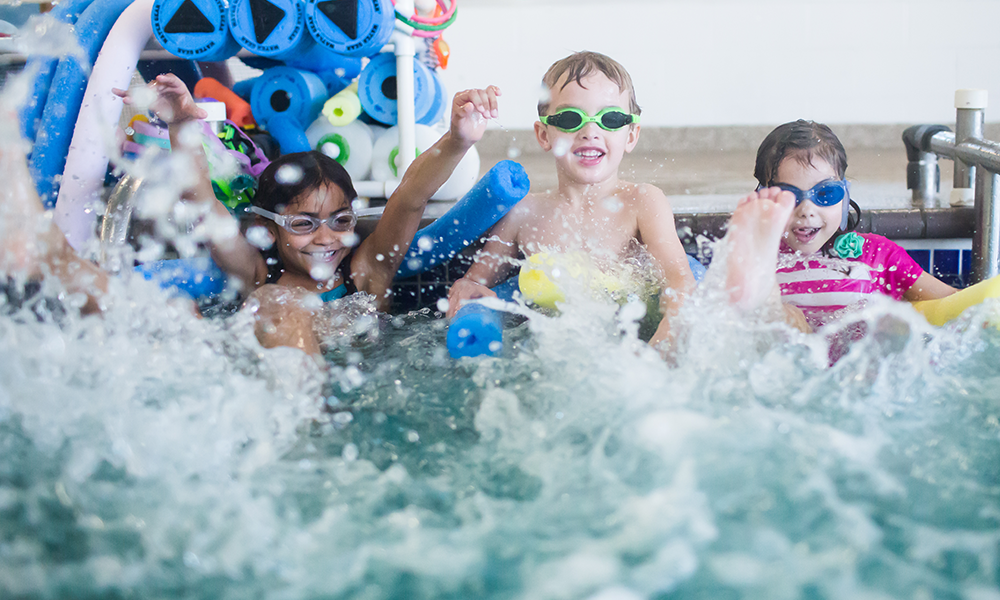At Foss Swim School, it goes without saying that we’re big fans of swimming. But for someone who didn’t grow up swimming, the benefits might not be as obvious – benefits like mental development in kids, safety, fun, socialization and healthy exercise. So we dug up some compelling facts about what makes swimming so special:
MENTAL DEVELOPMENT
Kids who learn to swim at a young age reach developmental milestones earlier, according to a study by the Griffith Institute in Australia.
reach developmental milestones earlier, according to a study by the Griffith Institute in Australia.
These included:
- Physical milestones
- Visual-motor skills
- Mathematical skills
- Oral expression
Another study looked at the academic performance of young competitive swimmers, and found that the greater the intensity of their physical activity, the better their academic performance in school.
Physical activity like swimming is also linked to better mental health and positive attitudes, and swimming is an excellent way to help build a child’s self-confidence.
SAFETY
It starts with child safety, but it’s really a lifelong issue.  The Red Cross estimates that only 56% of Americans can perform these 5 steps:
The Red Cross estimates that only 56% of Americans can perform these 5 steps:
- Jump into water over their head
- Return to the surface to float or tread water for 1 minute
- Circle to visually identify an exit
- Swim 25 yards to the exit
- Exit the water
In a Center for Disease Control study 37% of American adults said they could not swim 25 yards – a typical pool length.
All of this adds up to a large proportion of the country that is at increased risk of drowning, especially children 1-4 years of age, who have the highest drowning rates. While there is no such thing as complete safety around water – even experienced swimmers have some risk – risk is reduced by 88% through swim lessons. And when a person can swim, they in turn have the ability to help others who might not have that skill – making swimming a skill that can save your own life and someone else’s.
FUN
 Time spent in and around water is fun! When children know how to swim, they and their parents will have more confidence around water and be able to participate more fully; as they grow, they will be able to choose from a wide range of water activities:
Time spent in and around water is fun! When children know how to swim, they and their parents will have more confidence around water and be able to participate more fully; as they grow, they will be able to choose from a wide range of water activities:
- Waterside fun (visiting the beach, boating, pool parties, holidays at the lake)
- Competitive sports (diving, triathlon, synchronized swimming, water polo and other team sports)
- Individual activities (surfing, SCUBA diving and snorkeling, waterskiing, wakeboarding)
- Waterborne activities (kayaking, whitewater rafting, rowing, paddleboarding)
According to the Physical Activity Council, water sports participation in the U.S. has increased over the past years, from 12.4% of the population in 2011 to 13.8% in 2016.
SOCIALIZATION
When your child has swimming skills, a whole new range of activities 
and opportunities to have fun open up to them. Both children and parents will have more fun when they have more confidence and less fear around water. And many of these activities have the added benefit of being group activities, where friendships and memories grow:
- Parties on or by the water
- Cooling off at local pools and water parks
- Swimming on teams
- Making swimming part of lifelong fitness
In fact, scientific studies conclude that sports and activities like swimming are associated with general positive well-being at a pivotal point in life.
EXERCISE
Swimming is an excellent form of exercise.  It offers a unique mix of attributes that make it a good main exercise for kids and adults:
It offers a unique mix of attributes that make it a good main exercise for kids and adults:
- Cardiovascular: Swimming burns calories at a rate comparable to running or cycling, and like those exercises allows for variable intensity
- Full-body: Unlike most physical activities, swimming uses muscles of the arms, legs and core
- Low-impact: Unlike running and many team sports, swimming does not create any jarring effects on joints
In addition, swimming appears to help people stay physiologically younger. Researchers discovered that frequent swimmers delayed the onset of the aging process by many years. While this research looked at top swimmers, anyone can benefit from a lifetime of swimming!
It’s never too early or too late
As early as 6 months of age, your child can start down the path to a lifetime of swimming benefits. But kids of all ages can learn to swim – at Foss Swim School, we make sure they learn in a comfortable environment with kids of similar age and skill level so they can heave fun and learn together.
If you are one of the millions of American adults who can’t swim as well as you’d like, it’s never too late to get the benefits. Join the hundreds of adults choosing to learn to swim at Foss Swim School and experience the magic of water confidence. Our adult levels are tailored to your need, whether you are uncomfortable in water, have some swim skills, or want to extend your swimming ability. So come on in – the water’s fine!
